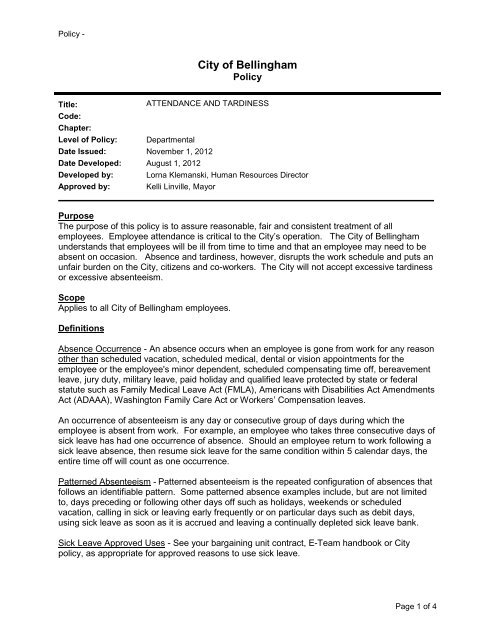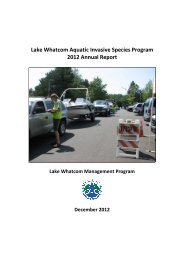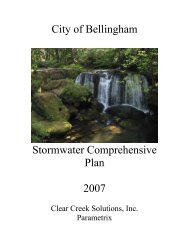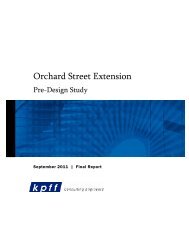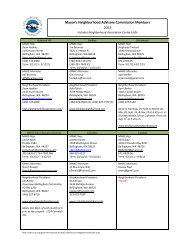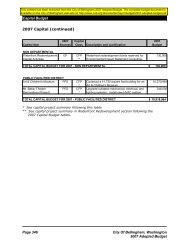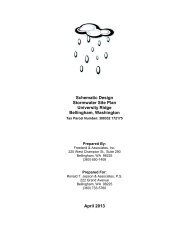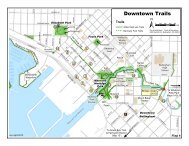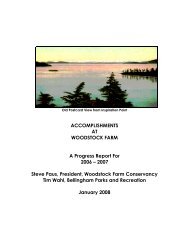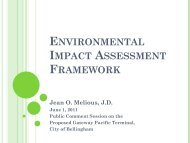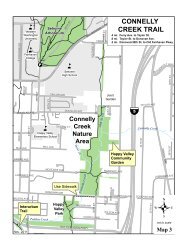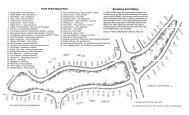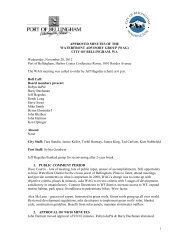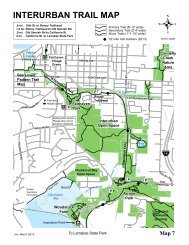Attendance Policy (PDF) - City of Bellingham
Attendance Policy (PDF) - City of Bellingham
Attendance Policy (PDF) - City of Bellingham
Create successful ePaper yourself
Turn your PDF publications into a flip-book with our unique Google optimized e-Paper software.
<strong>Policy</strong> -<br />
<strong>City</strong> <strong>of</strong> <strong>Bellingham</strong><br />
<strong>Policy</strong><br />
Title:<br />
ATTENDANCE AND TARDINESS<br />
Code:<br />
Chapter:<br />
Level <strong>of</strong> <strong>Policy</strong>: Departmental<br />
Date Issued: November 1, 2012<br />
Date Developed: August 1, 2012<br />
Developed by: Lorna Klemanski, Human Resources Director<br />
Approved by: Kelli Linville, Mayor<br />
Purpose<br />
The purpose <strong>of</strong> this policy is to assure reasonable, fair and consistent treatment <strong>of</strong> all<br />
employees. Employee attendance is critical to the <strong>City</strong>’s operation. The <strong>City</strong> <strong>of</strong> <strong>Bellingham</strong><br />
understands that employees will be ill from time to time and that an employee may need to be<br />
absent on occasion. Absence and tardiness, however, disrupts the work schedule and puts an<br />
unfair burden on the <strong>City</strong>, citizens and co-workers. The <strong>City</strong> will not accept excessive tardiness<br />
or excessive absenteeism.<br />
Scope<br />
Applies to all <strong>City</strong> <strong>of</strong> <strong>Bellingham</strong> employees.<br />
Definitions<br />
Absence Occurrence - An absence occurs when an employee is gone from work for any reason<br />
other than scheduled vacation, scheduled medical, dental or vision appointments for the<br />
employee or the employee's minor dependent, scheduled compensating time <strong>of</strong>f, bereavement<br />
leave, jury duty, military leave, paid holiday and qualified leave protected by state or federal<br />
statute such as Family Medical Leave Act (FMLA), Americans with Disabilities Act Amendments<br />
Act (ADAAA), Washington Family Care Act or Workers’ Compensation leaves.<br />
An occurrence <strong>of</strong> absenteeism is any day or consecutive group <strong>of</strong> days during which the<br />
employee is absent from work. For example, an employee who takes three consecutive days <strong>of</strong><br />
sick leave has had one occurrence <strong>of</strong> absence. Should an employee return to work following a<br />
sick leave absence, then resume sick leave for the same condition within 5 calendar days, the<br />
entire time <strong>of</strong>f will count as one occurrence.<br />
Patterned Absenteeism - Patterned absenteeism is the repeated configuration <strong>of</strong> absences that<br />
follows an identifiable pattern. Some patterned absence examples include, but are not limited<br />
to, days preceding or following other days <strong>of</strong>f such as holidays, weekends or scheduled<br />
vacation, calling in sick or leaving early frequently or on particular days such as debit days,<br />
using sick leave as soon as it is accrued and leaving a continually depleted sick leave bank.<br />
Sick Leave Approved Uses - See your bargaining unit contract, E-Team handbook or <strong>City</strong><br />
policy, as appropriate for approved reasons to use sick leave.<br />
Page 1 <strong>of</strong> 4
Tardiness - Tardiness includes arriving at work after the scheduled start time, leaving before the<br />
scheduled shift ends or overstaying meal or rest periods. Two tardiness occurrences equal one<br />
additional absence occurrence.<br />
Rolling 12-month Evaluation Period - A twelve-month period <strong>of</strong> time immediately preceding the<br />
most recent tardiness or absence occurrence.<br />
Vacation or Compensatory Time in Lieu <strong>of</strong> Sick Leave - When earned vacation or compensatory<br />
time is substituted for sick leave per policy or bargaining unit agreement, the time away from<br />
work will be considered an absence occurrence unless the vacation or compensatory time<br />
usage was pre-approved and scheduled by the supervisor or department manager.<br />
<strong>Policy</strong>/Conditions<br />
Departments comply with standards <strong>of</strong> attendance and tardiness policy.<br />
Standards for Determining Excessive Absenteeism<br />
The <strong>City</strong> recognizes that different departments and workgroups have different requirements for<br />
operational and customer service needs.<br />
In general, unless a department establishes a different standard, the <strong>City</strong> <strong>of</strong> <strong>Bellingham</strong><br />
standards and disciplinary processes shall apply. Absence occurrences during the previous<br />
12-month period will result in the following actions:<br />
4 th Occurrence <strong>of</strong> Absence Documented Verbal Warning<br />
5 th Occurrence <strong>of</strong> Absence Written Warning<br />
6 th Occurrence <strong>of</strong> Absence 1-Day Unpaid Suspension<br />
7 th Occurrence <strong>of</strong> Absence One Week Unpaid Suspension<br />
8 th Occurrence <strong>of</strong> Absence Termination <strong>of</strong> Employment<br />
Patterned or Habitual Absenteeism/Tardiness<br />
Although occurrences will roll <strong>of</strong>f an employee’s record after twelve months, those who have<br />
established an ongoing pattern <strong>of</strong> absences, such as consistently having six or more<br />
occurrences in any given twelve-month period or routinely calling <strong>of</strong>f on Mondays and/or Fridays<br />
(or other patterns as shown above) may trigger step discipline, even though twelve month old<br />
infractions have fallen <strong>of</strong>f, if the employee continues to incur occurrences.<br />
Employees are expected to schedule appointments outside <strong>of</strong> work time when possible.<br />
Consistently utilizing sick leave for scheduled medical, dental and vision appointments when it is<br />
possible to schedule them outside <strong>of</strong> work time will be considered patterned absenteeism.<br />
Absence Records Review<br />
Supervisors are responsible for maintaining and reviewing absence records <strong>of</strong> their employees.<br />
If an employee has an attendance problem (excessive tardiness, absences or a combination <strong>of</strong><br />
both it will be addressed with the employee as soon as it is noted. No formal corrective action<br />
will occur without prior counseling <strong>of</strong> the employee. Absence records may be used for any<br />
performance evaluations and advancement considerations. Absence records will be based on<br />
absence occurrences. The reason for each absence occurrence will be recorded in order to<br />
Page 2 <strong>of</strong> 4
ensure the protected status <strong>of</strong> qualifying leaves.<br />
Medical Certification<br />
Employees with a single absence occurrence <strong>of</strong> more than 5 days (or equivalent number for<br />
employees on alternative shifts) will be required to provide their Department Head with a<br />
doctor’s statement supporting the necessity for the absence. Absences in excess <strong>of</strong> 5 days may<br />
be FMLA qualifying (see PER 07.01.07). These occurrences must be evaluated by Human<br />
Resources and, if found to be FMLA qualified, processed in accordance with the policy. FMLA<br />
qualifying absences are to be recorded as such on absence records and will not be counted as<br />
an occurrence <strong>of</strong> absenteeism.<br />
When an employee has accrued 4 absenteeism occurrences, the <strong>City</strong> may require the<br />
employee to provide a doctor's statement supporting the necessity for each additional<br />
occurrence <strong>of</strong> absence, regardless <strong>of</strong> the length <strong>of</strong> the absence.<br />
Procedure<br />
Reporting Procedures<br />
Employees must report absences in advance following their work group's established<br />
procedure. If there is no work group procedure, employees must call their supervisor or<br />
manager at least 15 minutes before the scheduled start time unless an emergency has occurred<br />
or previous absence notice was given. The employee must provide information regarding the<br />
reason for the absence, specifying whether the employee is ill or the employee is caring for a<br />
dependent child or other family member. If the absence is due to illness, employee must<br />
provide an estimated return-to-work date and a phone number where the employee can be<br />
reached for follow-up. Should the supervisor or manager be unavailable to take the call, the<br />
employee must leave a voice mail message providing the same information.<br />
Should an employee be incapacitated to such an extent as to be unable to call in personally,<br />
he/she is responsible to have someone else report the absence.<br />
Failure to notify the supervisor when the employee is not able to be at work is a serious <strong>of</strong>fense<br />
due to the disruption to work schedules and the burden it places on fellow workers. The<br />
disciplinary process may be accelerated for no-call absence occurrences and may result in<br />
immediate termination <strong>of</strong> employment.<br />
Any single no-call absence occurrence lasting three consecutive days will be considered<br />
voluntary job abandonment. In this circumstance, the <strong>City</strong> will presume the employee has<br />
voluntarily resigned and end the employment relationship.<br />
Legal Compliance<br />
At no time will this policy serve to over-ride any greater legal protections under the applicable<br />
federal or state statutes such as ADAAA, FMLA or the Washington Family Care Act. Any<br />
questions regarding either the ADAAA or the FMLA should be referred to Human Resources.<br />
Page 3 <strong>of</strong> 4
Employees Exempt from Overtime<br />
Employees holding positions that are legally exempt from the overtime provisions <strong>of</strong> the Fair<br />
Labor Standards Act (FLSA) are paid for the body <strong>of</strong> work they accomplish, rather than hours<br />
worked. This exemption may alter the application <strong>of</strong> this policy.<br />
Administration <strong>of</strong> this <strong>Policy</strong><br />
The <strong>City</strong> reserves the right to exercise its discretion in applying this policy under special or<br />
unique circumstances and to accelerate the corrective action schedule or repeat steps, as<br />
appropriate to the situation, to appropriately apply the principles <strong>of</strong> progressive discipline.<br />
Page 4 <strong>of</strong> 4


